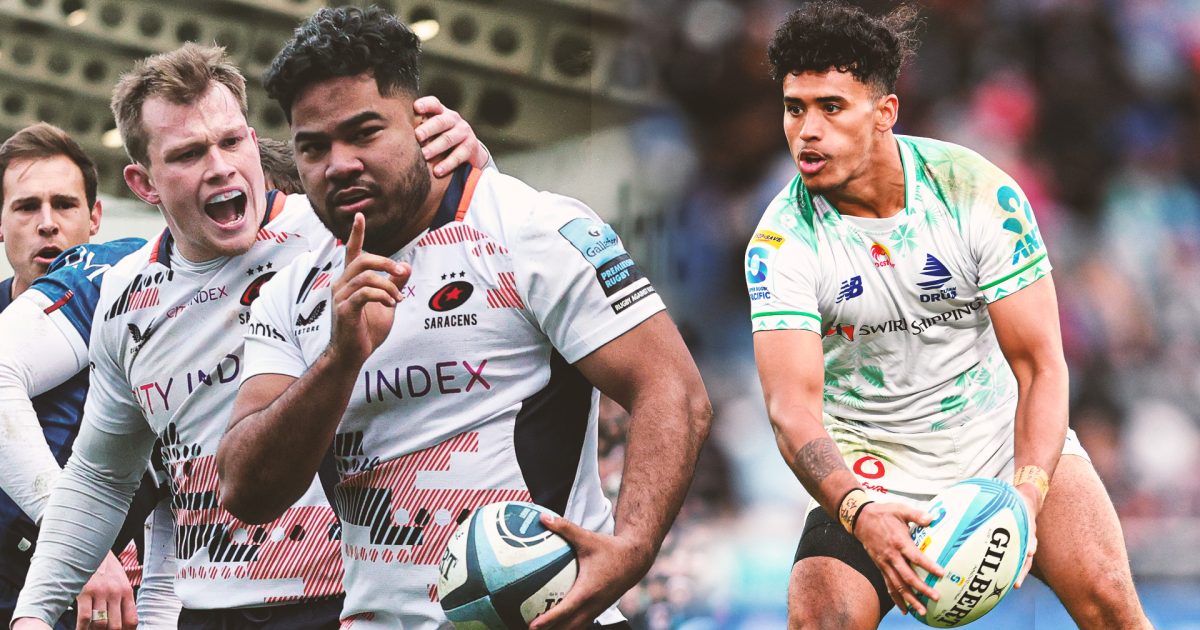Six players who can light up the Pacific Nations Cup

The newly branded six-team Pacific Nations Cup will be staged across five weekends with the champion crowned at the Grand Final in Osaka on Saturday, 21 September.
Designed to drive competitiveness, the Pacific Nations Cup 2024 will provide a crucial staging post on the road to the expanded 24-team Men’s Rugby World Cup 2027 in Australia.
Who will make a name for themselves in Pacific Nations Cup 2024?
Theo McFarland (Samoa)
Samoa has had some legendary loose forwards as captains like Pat Lam and Semo Sititi. Theo McFarland could be another chip off the old block. He’s been a fan favourite in North London winning a Try of the Season award and Premiership with Saracens. His partnership with the likes of English internationals Ben Earl and Billy Vunipola has been imposing.
McFarland grew up playing rugby with a Pepsi bottle filled with old banana leaves as a makeshift ball and now he is captaining his country, despite only having 13 caps.
McFarland played international basketball for Samoa. Samoa has won the Pacific Nations Cup four times, most recently in 2022. Samoa have beaten Italy 33-25 and Spain 34-30 in 2024. Samoa’s squad has been bolstered by Moana Pasifika contingent Danny Toala, Sama Malolo, Luteru Tolai, Michael Curry, Samuel Slade, Meelani Matavao, Jonathan Taumateine and Alai D’ Angelo Leuila.
Kapeli Pifeleti (USA)
The hooker is one of only two players in the US squad not based in America. He plays for Saracens in England where he’s made 44 appearances and been mentored by English international Jamie George. In 2022-23 Saracens won the Premiership.
Pifeleti was born in Tonga, lived in San Francisco and represented England Under-18s before being named in the roster for the USA Selects ahead of the 2018 Americas Pacific Challenge.
He made his senior debut in a win against Brazil in February 2019 and the combative competitor has been a regular since.
Isaiah Armstrong-Ravula (Fiji)
Like his All Blacks uncle Richie Mo’unga, Isaiah Armstrong-Ravula was something of a prodigy at St Andrew’s College in Christchurch helping the First XV win the local championship for the first time in their centenary.
Armstrong-Ravula quickly graduated to Manawatu in the NPC and was then signed to the Fijian Dura for Super Rugby Pacific. In 2024 he played 14 games and scored 106 points as the Dura won five games.
He made his international debut in a 21-12 win against Georgia on 6 July.
Fiji are the defending champions and have won the Pacific Nations Cup six times with 33 victories in 52 matches overall.
Mamoru Harada (Japan)
A Japan XV created history with their monumental upset of the Maori All Blacks in July. Harada was a key figure in a superb performance by the local forwards. His throwing was precise, the Japan XV maul imperious, and Harada carries and tackles robustly.
Harada debuted for the Japan national team in 2023 and has played all three tests.
He was a standout for the Toshiba Brave Lupus who won Japan League One upsetting Saitama Wild Knights, who won all 17 games, 24-20 in the final.
In Japan’s Pacific Nations Cup squad, only four players have won more than 20 caps, while 21 have 10 caps or fewer and seven members of the squad are yet to play at test level.
Andrew Quattrin (Canada)
The veteran hooker is in arguably career-best form. In the New England Free Jacks’ run to the Major League Rugby title, he contributed a dozen tackles and 10 carries in their 20-11 defeat of the Seattle Seawolves in the championship match.
In the Eastern Conference final the previous week, Quattrin scored a try in the 23-17 victory over the Chicago Hounds 23-17 and his performances across the season earned him a place in the 2024 All-MLR second team.
Quattrin is from Ontario and began his journey to professional rugby at Wilfrid Laurier University. As a student-athlete, Quattrin was a four-time Ontario University Athletics (OUA) Men’s Rugby All-Star and the first rugby player to be named OUA MVP.
He played three seasons for the Toronto Arrows before heading to New Zealand, where he played the 2022 season for Manawatu. Since joining the Free Jacks, he’s won two championships and passed the milestone of 75 Major League matches.
Quattrin debuted for Canada five years ago and played three times at the 2019 Rugby World Cup. He has 22 caps overall. Canada is ranked 21st in the world.
Lotu Inisi (Tonga)
The past two seasons have been meteoritic for the dynamic loose forward. Inisi earned his Super Rugby Pacific debut for Moana Pasifika in 2023 and averaged 15 carries a game combined with abrasive defense.
The New Zealand Rugby Almanack noted during his NPC season for North Harbour that Inisi “proved to be the supersub, invariably adding impact and scoring four tries.”
In 2024 Moana Pasifika enjoyed their best season winning four matches. Inisi was involved in three of those victories against the Waratahs (27-12), Western Force (22-14) and Fijian Dura (39-36). Nicknamed ‘Skuxx,’ Lote is the brother of former Tongan international Fine Inisi.
He debuted for Tonga against Fiji in 2022 and played in the July international against Spain. Tonga has only five survivors from Rugby World Cup 2023.





















































